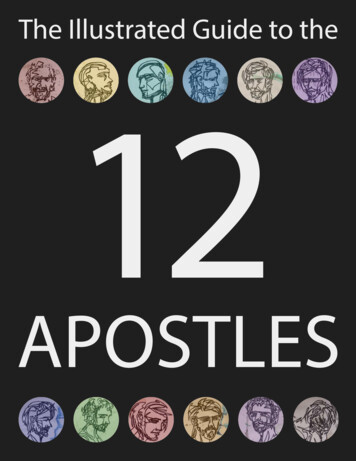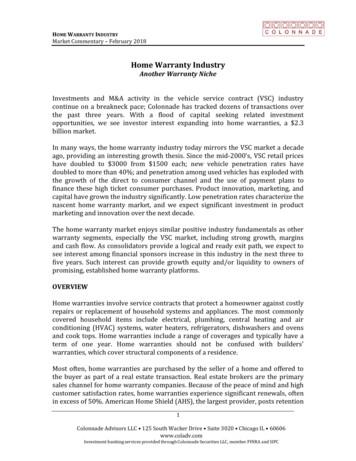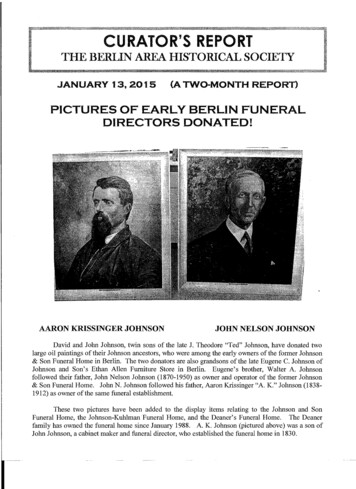
Transcription
About this bookDuring Jesus’ ministry on earth, he amassed many followers. Hechose twelve of these disciples to accompany Him, preach Hisword, heal the sick, and cast out demons. Of these, 11 wouldbecome church leaders after Jesus’ resurrection.One would betray Him.About the authorJeffrey Kranz creates Bible-study material at the Overview BibleProject. He’s a Christian who loves studying the Bible, and wantsto show off how interesting it is.About the artistLaura Converse is a surreal artist who makes art based on theBible, philosophy, and her own imagination.PAGE 2
Table of omew26Thomas30Matthew34James, son of Alphaeus37Simon39Thaddaeus43Judas47PAGE 3
PETER
Simon PeterNo apostle stands out like Peter. Even when fellow apostlesMatthew and John write down the story of Jesus, they give moreattention to Peter than themselves. And for good reason: of allthe apostles (besides maybe Judas), Peter is most involved in thegrand story of Jesus.Peter rocksHis original name is Simon, but Jesus give him the moniker themoment they meet. “Peter,” means “stone,” and the name sticks(Jn 1:42).PAGE 5
The name takes on a deeper meaning later in the story. WhenJesus asks the disciples who they think Jesus is, only Peter speaksup: “You are the Christ, the Son of the living God” (Mt 16:16).Then Jesus makes a play on words: “You are Peter [stone], and onthis rock I will build my church.”And Jesus does. Paul says the church is built on the apostles, andMatthew puts Peter first among them (Ep 2:19–20; Mt 10:2). Infact, Peter’s always first in the lists of the apostles.Bold (besides the denial)If you ever have to describe Peter inone word, I recommend “bold.” Peter iscourageous, outspoken, and impulsive.For example, the other apostles freak out when they see Jesuswalking on the Sea of Galilee, but Peter jumps out and walksto Jesus (Mt 14:29). When Peter, James, and John see Jesustransfigured, only Peter can find the words to blurt out (Lk 9:33).PAGE 6
Peter even has the guts to pull Jesus aside to talk the Lord out ofdying (Mt 16:22).Peter plans to support Jesus to the bitter end. He’s willing to diefor Jesus, and even cuts off a man’s ear in an attempt to defendthe Lord (Mk 14:29, 31; Jn 18:10).Despite all his bravado, Peter’s more famous for denying Jesusthree times. But to his credit, most of the other apostles turn tailand run. At least Peter follows Jesus to his trial. (Jn 18:15–16)Peter’s boldness rebounds after the resurrection. When theHoly Spirit is poured out over the disciples, Peter is the one whostands up and preaches the gospel to the masses. Peter callsout the Jews for crucifying the Messiah they’d been waiting for.Peter tells the Jewish Christians that Gentiles are welcome in thechurch (Ac 2:14, 3:14–15, 11:1–18). Peter’s a bold fellow.PAGE 7
Bible authorOnly three of the twelvecontribute to the New Testament,and Peter is one of them. Hisearliest contributions are in theGospel of Mark.Peter works alongside John Markin ministry, and comes to care forhim as his own son (1 Pe 5:13).According to tradition, Mark wrotedown the story of Jesus as Petertold it to him: the Gospel of Mark isPeter’s take on the life of Jesus.Peter also writes two books of theBible on his own: First and SecondPeter. He wrote these letter toChristians living as foreignersacross the Roman empire(1 Pe 1:1; 2 Pe 2:1).PAGE 8Fun factMatthew and Johnare the only othermembers of thetwelve who write NewTestament books.
Crucified upside-downPeter was martyred in Rome for the Lord he once denied.According to tradition, he boldly requested to be crucifiedupside-down, as he was unworthy to die in the same manner ashis King.PAGE 9
JAMES
James, son of ZebedeeJames is the fiery apostle who’s almost always doing thingsin tandem with his brother John. He’s an ambitious man, apassionate man, a man devoted to Jesus.James leaves everything behind for the Lord—including hisfather’s family business. Zebedee is successful enough tosupport his family along with multiple paid employees (Mk 1:20).And since James is always mentioned before John, it’s possiblehe’s the eldest—the heir to the family business.But when Jesus calls him, James immediately drops everything,leaves his father, and follows Jesus. His brother John comes, too(but we’ll talk about him later).And just so you know: this is not the James who wrote thebook of James—that was probably Jesus’ brother (Jam 1).PAGE 11
First to dieOne time, James and John demand seats of honor in Jesus’kingdom. Jesus tells them they don’t really know what they’reasking for: “Are you able to drink the cup that I drink, or to bebaptized with the baptism with which I am baptized?”Jesus is referring to a hard life and a martyr’s death. James is surehe can take it (Mk 10:38).And he does. James is the first apostle to be martyred: Herodputs him to death with the sword in an attempt to please theJewish community (Ac 12:1–2).PAGE 12
Sons of ThunderJust like Jesus names Simon “Peter,” the Lord gives Jamesand his brother John the nickname “Sons of Thunder” (Mk3:17). The Bible doesn’t say why.However, the gospels give us a few glimpses of theirstormy personalities. For example, when a city deniesJesus lodging, they propose calling fire from heaven ontothe town.Don’t worry: Jesus sets them straight (Lk 9:51–56).PAGE 13
JOHN
JohnHe’s the other Son of Thunder. While James dies a quick death ata younger age, John lives as much as 60 more years after Jesus’resurrection. James burns out quick and bright like lightning;John rolls on like thunder.After the resurrection, John becomesa pillar of the early church (Ga 2:9).He works miracles with Peter. Heteaches whole churches. He disciplinesrenegades. He writes personal notes ofencouragement.John is a Son of Thunder, the apostle of love, and the one whohas the vision of Jesus’ glorious return.Apostle of loveAccording to church tradition, John is the “disciple Jesus loved”PAGE 15
and the author of the Gospel of John. It’s John who recordedJesus’ most famous quote: “For God so loved the world, that Hegave His only begotten Son, that whoever believes in Him shallnot perish, but have eternal life” (Jn 3:16).No other apostle focuses on love like John. His gospel mentionslove more than any other book of the New Testament. If youinclude the Old Testament, John’s gospel comes in second, onlyto Psalms—which is twice as long!Plus, John’s first epistle mentions love more often than any otherbook of the Bible: about once every 55 words.John writes the mostAccording to tradition, John writes thefourth gospel, three epistles, and theapocalypse Revelation.PAGE 16
That’s just under 5% of the Bible. In fact, only Luke and Paul writemore of the New Testament than John.Exile at the endJohn ministered in Ephesus, and isexiled to the Isle of Patmos for his faith.Traditions vary on how the apostle Johndies (Rev 1:9).The threeThree of the apostles are especially close to Jesus:Peter, James, and John. These men witness Jesus’transfiguration. They see him raise Jairus’s daughterfrom the dead. And they pray with him in Gethsemane(Mt 17:1; Mk 5:37, 14:33).PAGE 17
ANDREW
AndrewThe Bible doesn’t give Andrew a cool nickname like his brotherPeter. But the church has one for him: Protokletos. It’s Greekfor “first-called,” because of the twelve, Andrew was the first tofollow Jesus.In fact, Andrew was in the disciplingbusiness well before the other eleven.Before Jesus begins his ministry, Andrewfollows another important prophet: Johnthe Baptist.One day, John points Jesus out to Andrew, saying Jesus is theLamb of God who takes away the sins of the world. Andrewspends the rest of the day with Jesus. By nightfall, he’s sure oftwo things:1. Jesus is the long-awaited Messiah.2. He has to tell his brother Simon (Jn 1:38–41).PAGE 19
From working nets to networkingAndrew is a fisherman like Peter, andJesus promises to make them both“fishers of men” (Mt 4:18–19). After theresurrection, Peter leads the early churchand converts many to the faith.But we see Andrew bringing peopleto Jesus even earlier. In fact, wheneverAndrew comes up in the story of Jesus,he’s bringing people to the Lord.Andrew introduces his brotherto Jesus. When 5,000 people gethungry at once, Andrew bringsJesus a boy with bread and fish—and Jesus uses the food to feedthe multitude. Andrew even helpsPhilip bring some God-fearingGreeks to see Jesus(Jn 1:41, 6:8–9, 12:20–22).PAGE 20Fun factOn one occasion,Andrew joins theThree to ask Jesusabout the future(Mk 13:3).
Saint Andrew’s CrossAccording to tradition, Andrew wasbound to an X-shaped cross in Achaeaand crucified by the sea.Today, you can see Saint Andrew’s Cross on the Flag of Scotland,as Andrew is Scotland’s patron saint.BrothersThe Bible says two sets of brothers are member of thetwelve: Peter and Andrew, and James and John. Bothpairs are fishermen, and both worked together beforefollowing Jesus together.PAGE 21
PHILIP
PhilipOf all the apostles, I’m probably most drawn to Philip. He’s alevel-headed, well-educated, approachable guy. Plus, his namemeans “lover of horses,” which is pretty cool.When we first meet Philip, he tells hisfriend Nathanael that he has found “Himof whom Moses in the Law and also theProphets wrote” (Jn 1:38–41). Philip mayhave a Greek name, but he’s decentlyfamiliar with the Jewish Scriptures—ourOld Testament.Philip doesn’t get much face time in the gospels of Matthew,Mark, and Luke, but he’s vocal in the book of John—that’s theonly book of the Bible that really tells us anything about Philip.On that note: there are at least three Philips mentioned in theNew Testament. Philip the apostle is easily confused with Philipthe evangelist in Acts (Ac 6:5, 8:5ff )—don’t get mixed up!PAGE 23
PragmatistPhilip takes a practical approach tothings, but doesn’t always grasp justhow supernatural Jesus is.For example, remember the feeding of the 5,000? WhenJesus sees the multitude getting hungry and asks Philip a testquestion: “Where should we buy bread for everyone?”Not realizing that Jesus will feed them miraculously, Philip saysits impossible—not even 200 days’ wages could feed them all (Jn6:5–7).Obviously, this was long before Taco Bell.Philip has another moment like this on the night of Jesus’betrayal. Right after Jesus says that he is the only way to theFather, Philip proposes that Jesus just show them the Father.Again, Philip doesn’t understand that by seeing Jesus, he hasseen the Father.PAGE 24
Inviting and approachableLike Andrew, Philip invites other peopleto see Jesus. When Jesus calls Philipto follow him, Philip finds his friendNathanael, saying, “Come and see”(Jn 1:46).Philip also helps some God-fearing Greeks meet Jesus. TheGreeks approach Philip, Philip brings them to Andrew, and theyboth bring them to the Lord (Jn 12:20–22).Died in GreecePHILIPAccording to tradition, Philip took thegospel to Greece, and was martyredin Hierapolis. His tomb was reportedlyfound there in 2011.PAGE 25
BARTHOLOMEW
BartholomewWe don’t know much about this guy, folks. Matthew, Mark, andLuke list him as one of the twelve, and that’s all we got on thename “Bartholomew.”However, the church has generallyassumed that Bartholomew is the sameperson as the man named Nathanael inJohn’s gospel. There are a few reasons forthis.Firstly, Matthew, Mark, and Luke include Bartholomew in theirlists of the twelve apostles, but never mention a Nathanael.There’s no Nathanael in Acts or the epistles, either.Secondly, John never mentions Bartholomew, but he includesNathanael in stories that otherwise only feature other apostles.For example, he includes Nathanael in the story of Jesus meetingPAGE 27
Peter, Andrew, and Philip—all recognized as members of thetwelve by the time the Gospel of John was written.So that leaves us with a question: “Who’s this Nathanael guy, andwhy is he showing up in these apostle stories?”One answer the church has found: Nathanael is Bartholomew.If so, he wouldn’t be the only apostle to go by more than onename—Thaddaeus and Matthew do, too. I’ll side with traditionon this.Plus, Bartholomew literally means “son of Tolmai.” It’s possiblethat a man named Tolmai had a son named Nathanael, and somepeople just called him “Tolmai’s boy.”What else do we know?Not much, except that Bartholomewis originally skeptical about Jesus’hometown. He asks Philip, “Can anythinggood come out of Nazareth?”PAGE 28
Still, his curiosity gets the better of him, and Bartholomewfollows Philip to Jesus. When Jesus meets him, Jesus callsBartholomew “an Israelite indeed, in whom there is no deceit” (Jn1:47).Jesus knows all about Bartholomew, from the motives of hisheart to the tree he sits under. Bartholomew declares Jesus to behis Rabbi, God, and King on the spot. But Jesus tells him that he’llsee even greater things (Jn 1:45–51).And so he does. After Jesus’ resurrection, Nathanael goes fishingwith six other apostles and witnesses an apparition of the risenJesus Christ on the Sea of Galilee (Jn 21:2).PAGE 29
THOMAS
ThomasEven if you’ve never studied the apostles, you’ve heard aboutthus guy. He’s remembered as “doubting Thomas,” but in a way,you can’t blame him.Here’s the background: some of the other apostles see the LordJesus Christ risen from the dead and walking among the living.They go around telling their friends Jesus is alive, even thougheveryone knew he’d been killed and buried.To be fair, Thomas isn’t the only one who doubts this story (Mt28:17; Mk 16:11; Lk 24:38). He’s just the only one who wantsphysical proof.So later, Jesus appears to Thomas andthe others. Jesus invites the skepticto inspect his nail-pierced hands andthe hole in his side, where he hadbeen speared. Thomas believes, andproclaims, “My Lord and my God!”PAGE 31
More than a doubterUnfortunately, we don’t remember him as “brave Thomas”—eventhough the Gospel of John paints him that way, too.When Jesus hears Lazarus is dead, He plans to visit the grave—even though the local Jews want to kill Jesus. The other disciplestry to talk Jesus out of it, but it’s no good. Jesus is going to Judea.And it’s Thomas who rallies the other disciples to follow Jesus,even though it means they might all die with him (Jn 11:16).DidymusLike Simon “Peter” and the “sons ofThunder,” Thomas has a nickname:Didymus, which is Greek for “twin.” Wedon’t know why they call him that. If hehas a twin, the Bible doesn’t say.PAGE 32
However, Thomas doesn’t know where Jesus is going (before thecross), or the way to follow. (Jn 14:5)Martyred for his faithThomas was originally confused about where Jesus was goingand how to follow him (Jn 14:5). But after seeing Jesus aliveagain, Thomas follows and worships him to the end.According to tradition, Thomas takes the gospel to India. Heconverts many, but eventually he is run through by spears for hisbelief in Jesus.Thomas comes full circle. His faith beginswhen he sees Jesus’ spear wound. Hisministry ends with the same kind ofwound. Indeed, Thomas is true to hisfirst recorded words: “Let us also go, sothat we may die with Him” (Jn 11:16).PAGE 33
MATTHEW
MatthewTradition says Matthew wrote the gospel that bears his name,but the New Testament author didn’t have such distinguishedbeginnings. Before following Jesus, Matthew is a tax collector—one of the most hated kinds of people in that society.The Jews saw tax collectors as traitors and crooks (Mt 9:11), andthey had some good reason for this. Tax collectors took moneyfrom their countrymen on behalf of the Roman government. Andthey weren’t always honest when it came to setting tax brackets(Lk 19:8).But when Jesus sees Matthew sitting athis tax booth, the Lord sees more than acheater and traitor. He sees a disciple.And when Jesus calls, Matthew follows.PAGE 35
Levi?Matthew likely also went by the name Levi. Luke’s and Mark’sgospels tell the story of a tax collector named Levi, whose storyis almost identical to Matthew’s (Mk 2:14–15; Lk 5:27–29).Double namesMore than half of the apostles go by multiple names: aelMatthew/LeviThaddaeus/Judas/JudeJames and John / sons of thunderPAGE 36
JAMES (ALPHAEUS)
James, son of AlphaeusWe don’t know much about this James aside from who his fatherwas (Alphaeus, obviously).Because Matthew’s father was also named Alphaeus (Mk 2:14), itmight be tempting to think of Matthew and James as brothers.However, Matthew specifically points out sets of brothers in hislist of the twelve—and doesn’t pair himself with James (Mt 10:3).James the Less?The church has nicknamed him “Jamesthe Less” to avoid confusion with the sonof Zebedee, or “James the Great.”However, this probably isn’t the manMark calls “James the Less.” “Less” inthis sense means “little,” “short,” or even“junior.” (Mk 15:40)PAGE 38
SIMON
Simon the ZealotTwo apostles are named Simon: one of them is also called Peter,and the other is called “the Zealot.” We don’t know why Simongot this name, but it probably made it a little less confusing forthe other apostles.What’s a zealot?“Zealot” means “guy with zeal.” We getthe word “zeal” from the Greek word forthe sound water makes when it boils. Inthe Bible, zeal refers to all-consuming,white-hot reverence and desire forsomething.That means zeal can be good or bad, depending on what you’rezealous for. For example, Paul encourages us to be zealous forPAGE 40
good deeds (Ti 2:14). But Paul was also zealous about killing offChristians before he met Jesus (Php 3:6)!But what kind of zealot was Simon?He might have been a member of arevolutionary nationalist party. Thehistorian Josephus tells us that around6 A.D. a political party called the Zealotsarose. They were led by a man namedJudas (not one of the twelve). Theirmission: cast off the Roman governmentso that the Lord’s land would bereturned to the Lord’s people. They werezealous for the land God had promisedthem.Luke gives a nod to this party in the book of Acts (Ac 5:37). It’spossible that Simon was a member of this revolt as a young man.Of course, “zealot” may not have been a reference to the politicalparty. Simon may have just been an especially fervent and piousPAGE 41
member of the twelve—so much so that they just nicknamedhim “the zealot.”Remember the nicknames you and your friends gave each otherin high school? You can imagine how Simon could have got thisnickname John: “We really need more donkey chow.”James: “Send Simon to get some.”John: “Which Simon?”James: “I dunno. The zealous one, I guess.”Hacked in two?According to some traditions, Simon waskilled with a saw. Other traditions havehim martyred with Thaddaeus (by axe).PAGE 42
THADDAEUS
ThaddaeusWe’ll call him Thaddaeus for this section of the book, but that’sonly to avoid confusion. Thaddaeus is known by more namesthan any other apostle!Granted, some of that depends on themanuscripts different Bible translationsuse—and how the translators chose towrite his name. Even so, we still use atleast four different names when referringto this guy.#1: ThaddaeusWhen Matthew and Mark list the twelve, they call himThaddaeus, plain and simple (Mt 10:3; Mk 3:18). Most of today’sPAGE 44
popular Bibles (NIV, ESB, NLT, NASB) just call him Thaddaeus andmove on.#2: LabbaeusHowever, some Bible translations (KJV, NKJV) say his first name isLabbaeus and Thaddaeus is his surname (Mt 10:3; Mk 3:18).#3–4: Judas and JudeLuke and John call him Judas (or Jude). Or course, they make noroom for confusing him with Judas Iscariot, the one who betraysJesus (Lk 6:16; Jn 14:22).This is the Saint Jude who’s called the patron saint of lost causes.PAGE 45
Son of JamesLuke says Thaddaeus is the son of James, but that doesn’t meanhe’s related to any of the Jameses you’ve met in this book. Jameswas a common name in Jesus’ time. In fact, when Luke calls himthe son of James in Acts, there are three guys named James inthe same room!“What has happened?”Thaddaeus only has one spoken line in the Bible: “Lord, whatthen has happened that You are going to disclose Yourself to usand not to the world?”Jesus is explaining that he will be leaving for a time. The worldwill not see him, but those who love him will. Thaddaeuswonders how one group of people will see Jesus and everyoneelse not notice.PAGE 46
The answer: those who love Jesus will keep Jesus’commandments, and the Holy Spirit will teach them (Jn 14:22–27).Herald, evangelist, martyrChurch historian Eusebius says Thaddaeus goes to Edessa “asherald and evangelist.” He works miracles of healing—until he’sbeheaded by axe.PAGE 47
JUDAS
Judas IscariotYou’ve probably heard more about this apostle than any othermember of the twelve (besides Peter). Human history has seenmany a traitor, but nobody rivals Judas Iscariot in infamy. He’s themost iconic betrayer of all time: the man who sold his friend andmentor and God into the hands of his murderers.Here’s how it happens.History of betrayalThe apostle John tells us that Judas hadbeen doing some shady business longbefore he turned Jesus over. Judas is thetreasurer of the twelve, and he regularlyembezzles from the money box (Jn 12:6).But Judas knows how to keep up appearances. For example, onenight a woman named Mary (not Jesus’ mother) anoints JesusPAGE 49
with costly perfume. Judas is disgusted, and says the perfumeshould have been sold to benefit the poor.He cleverly advocates for the poor, but only so he can take hiscut from the generosity of others (Jn 12:5–6).A pathetic priceJudas is a cheap lackey, too. He agrees to hand Jesus over to thechief priests for just 30 pieces of silver (Mt 26:14–15).To put that in perspective, Moses hadtold the Jews long beforehand that ifa slave is accidentally killed by a farmanimal, the animal’s owner had to paythe slave’s master 30 pieces of silver(Ex 21:32).30That’s right: Judas handed over the Master of the universe for theprice of a common slave.PAGE 50
Of course, from this side of the resurrection, we can see thatprice as another example of Jesus’ humility. Paul tells us thatJesus took the form of a bondservant, and humbled himself to ashameful death (at a shameful price) on our behalf (Php 2:6–8).Under Satan’s influenceJudas was intending to betray Jesus for a while, but when thetime comes to pull the trigger, Judas doesn’t act alone. Luke andJohn say Satan enters Judas, moving him to make and executehis plans (Lk 22:3; Jn 13:2, 27).Kiss of JudasJudas keeps up his façade right down to the last second. Hetakes the mob to a place Jesus often met with the apostles, anddesignates their target with a friendly kiss (Lk 22:48).PAGE 51
SuicidalBut when Judas sees that the Jews arereally going to kill Jesus, the traitor feelsguilty. He realizes that he has betrayedan innocent man and tries to return thecash.But the priests don’t care what Judas believes or regrets. Theycan’t accept his silver for the temple treasury (since it’s bloodmoney), so they buy a field to bury strangers in—the Field ofBlood (Mt 27:3–5).As for Judas, he hangs himself. A man named Matthias takes hisplace among the twelve (Ac 1:18–26).PAGE 52
Any more?This guide walks through the twelve apostles that followed Jesusduring His ministry on earth, but they’re not the only ones theBible calls “apostles.”“Apostle” means “one sent,” or “ambassador.” And the Bible refersto a few other men as apostles:1. Matthias is chosen to take Judas’ place among the twelveapostles (Ac 1:26).2. Paul, the missionary who wrote most of the NewTestament epistles, is an apostle. Jesus Himself called Paulspecifically to preach the gospel to the non-Jewish world(Ro 1:1, 11:13; 2 Co 12:12; Ga 1:1).3. Barnabas, the missionary who first befriended Paul, is alsoan apostle (Ac 14:14).PAGE 53
4. Yet another James is called an apostle. This James is Jesus’brother, and probably the author of the New Testamentbook of James. He leads the church at Jerusalem alongwith Peter and John (Ga 1:19, 2:9).5. Paul uses the Greek word for “apostle” in a broader senseto describe a few people of the early church. The wordis often translated “messenger”; Epaphroditus is a goodexample of this (Php 2:25).6. Along with Paul, Timothy and Silas come as apostles to theThessalonians (1 Th 2:6).7. Just as these men were sent by Christ to represent Christ,Jesus was sent by God to represent God. Therefore,the author of Hebrews calls Jesus the Apostle of ourconfession.So although we tend to think of the twelve as the only apostles,there ware a few more in the Bible.PAGE 54
THANKS FOR READING!We hope you enjoyed this ebook from the OverviewBible Project.If you did enjoy it, how about telling your friends? They mightlike to learn more about the apostles, too. (And it’s free, so they’lllove you all the more!)Just click one of the buttons below to share this ebook.
Aug 12, 2014 · During Jesus’ ministry on earth, he amassed many followers. He chose twelve of these disciples to accompany Him, preach His word, heal the sick, and cast out demons. Of these, 11 would become church leaders after Jesus’ resurrection. One would betray Him. About the author Jeffrey Kranz creates Bible-study










